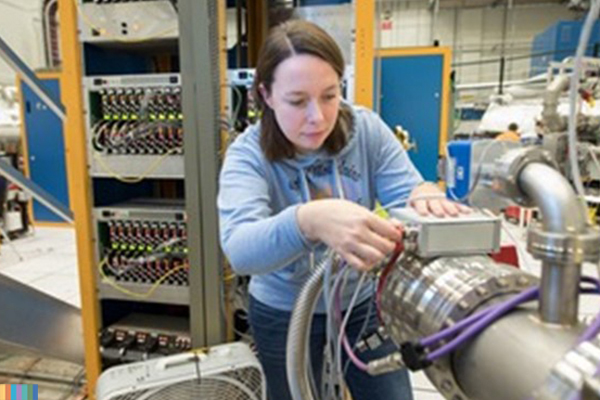Virtual seminar on High performance computing in the muon g-2 experiment at Fermilab

Our Liverpool Virtual Seminar Series on Data Intensive Science will recommence on Tuesday 10th October 2023 at 3pm GMT. The seminar will be given by Saskia Charity, a Senior Research Associate in the particle physics cluster at the University of Liverpool, who will present “High performance computing in the muon g-2 experiment at Fermilab”.
Seminars in this series cover R&D outside of the data intensive science CDT’s core research areas and give an insight into cutting edge research in this area. At the end of the talk there will be a Q&A session with the speaker.
About the talk
Despite being enormously successful over the last century, the Standard Model (SM) of Particle Physics has several major deficiencies. With nothing to say about Dark Matter or Dark Energy, which make up over 95% of the universe, the field of particle physics is charged with finding “new physics” which is missing from the SM. By making ultra-precise measurements and comparing them with SM predictions, we can perform robust tests of the SM and try to determine significant discrepancies that point to the existence of new physics.
The Muon g–2 Experiment at Fermilab recently published the measurement of the muon anomalous magnetic moment to 0.20 parts-per-million (ppm). This is the most precise measurement ever made at a particle accelerator. The measurement represents a dataset of 100 billion decay positrons, recorded using electromagnetic calorimeters. The result is dominated by the statistical uncertainty and over the next few years this is expected to halve when the total dataset which contains over 3x as much data, has been analysed. By this time, uncertainties in the theoretical prediction should be at a comparable level to the experimental precision, enabling a stringent test of the SM that could
provide a clear signal of new physics. There has been widespread excitement in this result worldwide, appearing in media from the BBC News to the New York Times.
This seminar will cover the numerous major high-performance computing requirements associated with making such a precise measurement. One example is data storage and processing: the total dataset contains 7 PB of raw data (4.5 million files) which must be reconstructed and analysed efficiently. This involves a multi-stage parallel workflow of 5000 jobs using grid computing, and the automated staging of data from tape storage to analysis machine. Another example is data collection: the experiment records 2GB of data every 8 seconds, which must be transferred to offline storage efficiently to prevent a backlog that prevents recording more data. The online computing requirements and fast reconstruction for data quality monitoring will be presented. Finally, the analysis strategy for making the final measurement will be presented, which includes several cutting-edge techniques including Artificial Intelligence/Machine Learning and GPU processing.
About the speaker
Saskia Charity is a senior Research Associate in the Particle Physics Cluster at the University of Liverpool, working on the g-2 and mu2e experiments at Fermilab and the MUonE experiment at CERN. Between 2018-2022 she was a Fermilab post-doc in the Muon Department, where she worked on many different aspects of the g-2 experiment. She is the analysis coordinator for the magnetic field analysis in the g-2 experiment. She received her Ph.D. from the University of Liverpool where she worked on track reconstruction algorithms for the g-2 straw tracking detectors. She received her MPhys in Physics with Philosophy from the University of York in 2014
How to attend
Participation is free, but you need to register to attend this and other webinars in the series. For more information and how to register please follow this link. Once registered, you will receive the Zoom connection details on the morning of the online seminar.
The seminar details
Speaker: Saskia Charity (University of Liverpool)
Seminar title: “High performance computing in the muon g-2 experiment at Fermilab”
Date/Time: Tuesday 10th October at 3pm GMT